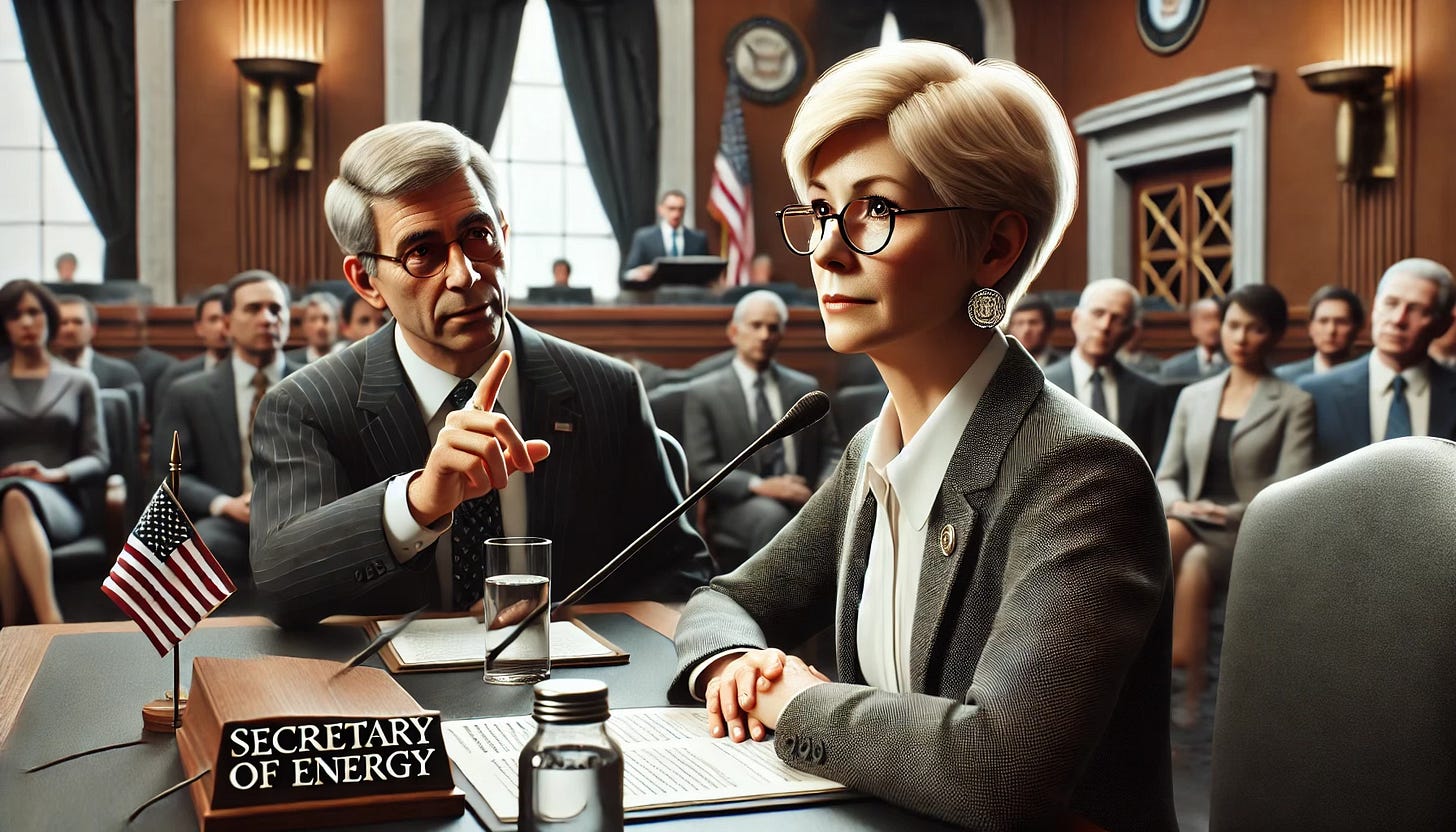
I was invited onto Michigan’s Big Show for a quick interview with Michael Patrick Shiels yesterday. MPS and I discussed my recent video analyzing President Trump's nomination of Chris Wright as Secretary of Energy.
MPS opened the interview with a recording of a tense back-and-forth between former Governor of Michigan and now Secretary of Energy Jennifer Granholm and Senator Josh Hawley.
In that clip, Senator Hawley openly criticized Granholm, claiming she had violated ethical standards under the STOCK Act. This hearing occurred after Granholm testified in April ‘23 that she had sold all potentially conflicting stocks of companies that could have benefited from the Secretary’s decisions at the Department of Energy. In a June ‘23 update, the Secretary admitted she had still owned stocks of six companies at the time of her earlier testimony. Granholm defended her actions as unintentional. She argued that she had sold the stock and updated the report once she discovered the stocks were still in her portfolio. Hawley dismissed her arguments as unacceptable. He accused her of delaying required reporting, misleading the committee, and advised her to resign or leave her position.
MPS used the clip as a unique introduction to the interview topic: President Trump’s nomination of Chris Wright, the CEO of Liberty Energy. The clip effectively drew the comparison between Granholm and Wright because, as I have written previously, President Biden’s energy and environment-focused appointees were fundamentally flawed.
The president is living proof of the old saying, “When you lie down with dogs, you get up with fleas.” His closest energy advisers and appointees are drawn from two quarters: a cloistered group of elite Washington insiders and the extreme wing of the progressive green movement. Under their guidance, federal policies can’t help but become infested with fanatical and dangerous ideas.
Experience: MPS asked me about Wright’s background and experience. I explained that Wright works in the oil and gas industry, has a degree in mechanical engineering, and has effectively grown his company to a market capitalization of over $3 billion. Wright is clearly an effective manager and competent leader.
Controversy: MPS then wondered about the controversies reported over Mr. Trump’s nominations. I pointed out that Wright’s nomination is only “controversial” if you wrongly believe fossil fuels are problematic and could (or even should) be phased out. Green activists might think that we can power a modern industrial nation on errant gusts of wind and diffuse sunbeams. However, a growing number of energy experts are willing to publicly question the wisdom of the Biden Administration’s net zero mandates and their trust in subsidies for unreliable wind and solar. Those of us who advocate for abundant, affordable, reliable domestic energy and free markets are happy to see Wright—someone with real-world experience in the energy industry—nominated to lead the Department of Energy. That industry experience is a refreshing change, given that I had previously explained how
private-sector energy officials … described White House staff as a “team [with] experience in renewable energy markets but relatively few people with detailed knowledge of oil markets.”
Climate change skeptic: MPS noted that Wright has been criticized as a “skeptic of mainstream climate science.” I agreed; Wright has publicly (and rightly) questioned the hyperbolic warnings from true believers, like AOC, who famously claimed, “The world is going to end in 12 years if we don't address climate change.”
While climate change is happening—the climate has been changing since the first day the sun started shining on the planet—I explained that it will not end the earth or cause the extinction of the human species. Even the IPCC doesn’t predict an end-of-the-world scenario if its “increasingly implausible” worst-case scenarios come true.
Benefitting from climate change anxiety: MPS rounded the interview out by asking who benefits when people are constantly terrified by the allegedly existential threat of a changing climate. I explained that many green groups can fundraise over that fear. Many government officials and agencies also wield enormous power and control government spending due to the claimed threat of a changing climate. For example, the recent agreement reached at the COP 29 meeting in Baku, Azerbaijan, committed developed nations to over $300 billion in support by 2035. However, developing nations that had initially sought more than $1 trillion described the commitment as “insulting.” They argued that the level of funding would be insufficient “to truly address the complexities of the climate crisis.”
It’s always a pleasure to join MPS on his show as it provides a unique opportunity to help listeners better understand some of the energy issues they are facing, voting on, and paying for. Once again, I hope you enjoy the interview and video. Please leave a comment and be sure to share this post.
Here’s my recent video on the Chris Wright nomination. You can also access it on the Mackinac Center’s Youtube channel.













Share this post